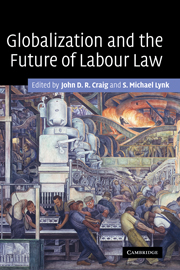Book contents
- Frontmatter
- Contents
- Notes on contributors
- Acknowledgements
- Table of cases
- List of abbreviations
- Introduction
- PART I Perspectives on globalization
- PART II International labour standards
- 3 The impact of globalization on labour standards
- 4 Globalization, decentralization and the role of subsidiarity in the labour setting
- 5 A game-theory account and defence of transnational labour standards – a preliminary look at the problem
- PART III The European Union
- PART IV The Americas
- PART V The ILO
- PART VI Labour rights
- Bibliography
- Index
4 - Globalization, decentralization and the role of subsidiarity in the labour setting
Published online by Cambridge University Press: 23 July 2009
- Frontmatter
- Contents
- Notes on contributors
- Acknowledgements
- Table of cases
- List of abbreviations
- Introduction
- PART I Perspectives on globalization
- PART II International labour standards
- 3 The impact of globalization on labour standards
- 4 Globalization, decentralization and the role of subsidiarity in the labour setting
- 5 A game-theory account and defence of transnational labour standards – a preliminary look at the problem
- PART III The European Union
- PART IV The Americas
- PART V The ILO
- PART VI Labour rights
- Bibliography
- Index
Summary
Introduction
La gloria di colui che tutto move
per l'universo penetra, e
risplende
in una parte più e meno altrove.
Dante Alighieri, ParadisoThe principle of subsidiarity prescribes that decisions should be made at the level where they can be most effective and, as far as is reasonable, by the level closest to the individuals affected. In the context of discussions over the appropriate direction of labour law reform in Italy, Marco Biagi argued that subsidiarity should be the leading principle of collective bargaining to respond to concerns about employer competitiveness in an increasingly global trading environment. In keeping with subsidiarity, Marco Biagi also believed that the scope of bargaining at the local level should not be dictated to the parties on the basis of some predetermined bargaining structure, but that it should “fall to the contractual agents themselves to define the field of application.”
The purpose of this paper is to take a fresh look at the role of subsidiarity in the labour context by focusing on the links between globalization and labour regulation in light of the current trend towards decentralization of collective bargaining. To that end, the key notions of globalization and decentralization will be examined and related to the structural and functional dimensions of subsidiarity in the context of labour regulation. The discussion will emphasize the potential of subsidiarity as a means to promote an inclusive democracy, and stress its pivotal role as an operative principle of social justice.
- Type
- Chapter
- Information
- Globalization and the Future of Labour Law , pp. 108 - 142Publisher: Cambridge University PressPrint publication year: 2006
- 5
- Cited by



